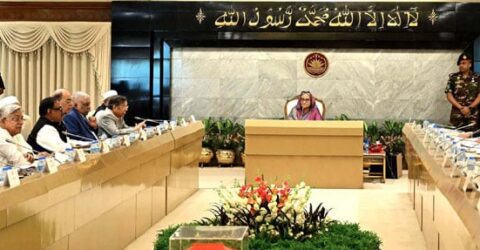Swiss delegation witnesses marginalized household activities in Rajshahi
The Bangladesh The Bangladesh
Today

A four-member delegation of Swiss Agency for Development and Cooperation (SDC) inspected the household activities of the marginalized people, including ethnic minorities, in the drought-prone Barind areas here.
During their daylong visit on Saturday, the delegation was accorded a traditional reception by the Santal ethnic community at Parbatipur in Gomostapur Upazila in Chapainawabgonj district.
Desk Officer SDC, Switzerland Baechler Markus and its Program Manager Bucherer Rebecca and SDC, Bangladesh Program Managers Sabina Yasmein Lubna and Shirin Sultana Lira were the team members.
Along with attending discussions on socio-economic and livelihood conditions of plain land ethnic minorities in Barind, the team members also visited two development projects to see its activities.
The projects are: ‘Resilience to Economic Volatility of Indigenous and Vulnerable Populations through Empowerment (REVIVE)’ and ‘Integrated Water Resource Management (IWRM)’.
Side by side with meeting with members of the water resources management committee in the water scarce areas, the team visited the IWRM project including ponds centered on the livelihoods of ethnic minority people.
They witnessed various promotional activities related to vermicompost for income generation, hand washing device and goat rearing by COVID 19 cash grant, pond re-excavation and fish culture.
The SDC team witnessed collaborative initiative of the IWRM and the REVIVE projects for water support together with sharing ideas of sustainability of both the projects with the local government bodies.
DASCOH Foundation and Swiss Red Cross are jointly implementing the REVIVE project in cooperation with HEKS/EPER supported by Switzerland since mid last year for contributing to the holistic development of disadvantaged communities, including 80 percent ethnic minorities.
The project is being implemented in six unions of Nachole and Gomostapur Upazilas in Chapainawabganj district.
Amid intervention of the project, around 1,500 marginalized households hardest-hit by the adverse impact of Covid-19 are getting humanitarian support, including monetary and income-generating training and assets as emergency response, in the region over the last one year.
The stimulus support is being given so that the beneficiary households can recoup their losses caused by the pandemic.
They are also being motivated to improve hygiene practices for protecting them from infection of the deadly virus through providing 1,500 hand washing devices.
Each of the households was brought under cash incentives worth Taka 4,000. They are being imparted training on various income-generating activities, including agriculture, vegetable farming, homestead gardening, fisheries, livestock, vermicompost and horticulture, based on their interest and choice.
Apart from this, the beneficiaries are being given post-training materials and logistic support so that they can engage themselves in the income-generating activities for improving their living and livelihood conditions after the best use of their knowledge acquired from the training.
The IWRM project is being implemented in drought-affected 42 union Parishads and three Pourasabhas under eight upazilas of Rajshahi, Naogaon and Chapainawabganj districts supported by Switzerland since 2015.
The project is intended to supply safe drinking water in those drought-prone areas where an acute crisis of drinking water exists. Its main objective is to supply round-the-year potable water to all people in the targeted area.
Among others, Dora Choudhury from HEKS/EPER, DASCOH Chief Executive Officer Akramul Haque and IWRM Project Coordinator Jahangir Alam Khan accompanied the delegation during the daylong visit




